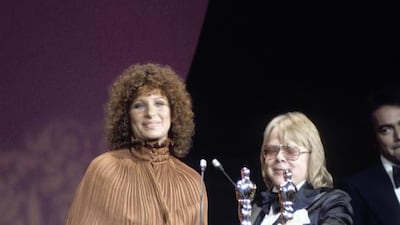La La Land goes into Sunday's Oscar ceremony with 14 nominations, a historic haul equalled only by All About Eve (in 1951) and Titanic (in 1998).
Perhaps its most deserving victory would be for Best Original Song. The film is a musical, so music is obviously at its heart, and Justin Hurwitz's score snagged two of the five song nominations – for City of Stars and Audition (The Fools Who Dream).
It is worth remembering, however, that the Academy has notoriously erratic taste, especially when it comes to music. A brief survey of past winners reveals little evidence of a formula for success. That said, winners do tend to fall into a few distinct camps.
The rock veteran, for example. The defining star turn came in 1994 with Bruce Springsteen's Streets of Philadelphia, from Aids drama Philadelphia. Bob Dylan took home the statuette in 2001 for the restrained, contemplative Things Have Changed, from the Michael Douglas movie Wonder Boys.
In 1995, Elton John earned a deserved win with Can You Feel the Love Tonight, one of three Best Original Song nominees from Disney's The Lion King.
Elton’s win highlights a crossover into another recurring theme for winning songs – the Academy’s soft spot for animation. In the absence of another knockout contender, the award often defaults to the latest Disney or Pixar movie.
Randy Newman won in 2002 and 2011, for Monsters, Inc. (If I Didn't Have You) and Toy Story 3 (We Belong Together), while Kiwi comic Bret McKenzie (of Flight of the Conchords fame) won in 2012 for Man or Muppet, from The Muppets (OK, that's not an animation but puppets are a closely related genre).
In 2014, the epic Let It Go from Frozen – credited to husband-and-wife songwriting team Kristen Anderson-Lopez and Robert Lopez – controversially beat Pharrell Williams's Happy (from Despicable Me 2).
The precedent for animated success in the modern era was set in 1990 with a win for Under the Sea, from The Little Mermaid. Further wins for Disney's resident songsmith Alan Menken followed in 1992 with Beauty and the Beast; a year later with Aladdin's A Whole New World; and in 1996 with Colors of the Wind from Pocahontas.
Animations won six out of 10 Best Original Song gongs in the 1990s.
It’s hard not to see this trend as a rebuke to a run of cynical pop tie-in winners in the 1980s, during which A-list stars dialled in one-off singles, often barely related to the film, as a mutually beneficial marketing tool.
Irene Cara won twice with the theme to Fame (in 1981) and Flashdance... What a Feeling (in 1984), setting off a golden era of perfect pop winners between 1984 and 1988: Stevie Wonder's I Just Called to Say I Love You (from The Woman in Red), Lionel Richie's Say You, Say Me (White Nights), Berlin's Top Gun theme Take My Breath Away and Dirty Dancing's (I've Had) The Time of My Life, sung by Bill Medley and Jennifer Warnes.
Some might argue the celebrity tie-in began earlier, perhaps in 1972 with Isaac Hayes's masterful funk Theme from Shaft – arguably the greatest film score ever – or with Barbra Streisand's wins for The Way We Were (1974) or, from A Star is Born, Evergreen (1977). But in both cases the partnership was a holistically collaborative, artistic effort – Hayes's Shaft score was integral to the movie's conception and appeal, while Streisand was the star of both pictures she won for.
Babs might have inspired Madonna's credibility-reviving turn in Evita, which produced 1997 winner You Must Love Me.
The same integral role was played by Eminem in the drama 8 Mile. Ironically, when his Lose Yourself won in 2003, it meant the first hip-hop song to be recognised came from a white rapper.
The Bond movies are the franchise that perhaps has done more than any other to nurture the idea of a celebrity-song tie-in. For the third film in the series, 1964's Goldfinger, producers called on the services of Shirley Bassey and the rest is history.
Yet it would be nearly five decades before 007 bagged his first Best Original Song Oscar, in 2013, for Adele's Skyfall. Sam Smith somehow repeated the feat three years later with the derivative Writing on the Wall from Spectre.
There is a theory that these retro-sounding Bond songs unite weary Academy voters by appealing to the forgotten grandeur of movie-themes past. Hollywood’s heyday for original music was long ago, when the studio system ruled and the musical was still a vibrant art form, rather than a kooky novelty.
This was the era of classics such as Fred Astaire singing The Way You Look Tonight, from 1936's Swing Time, and The Wizard of Oz's Somewhere Over the Rainbow (1939).
A little later, there were winners such as Moon River, which first appeared in the 1961 film Breakfast at Tiffany's, and Burt Bacharach & Hal David's standard Raindrops Keep Fallin' on My Head, from Butch Cassidy and the Sundance Kid (1969).
All of this bodes well for La La Land, which is a love letter to Hollywood's golden age, complete with a twee, nostalgic score at its overflowing, romanticised heart.
rgarratt@thenational.ae

